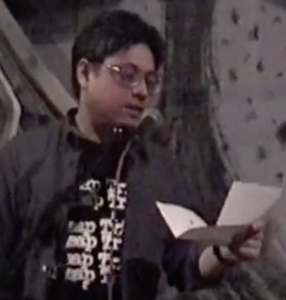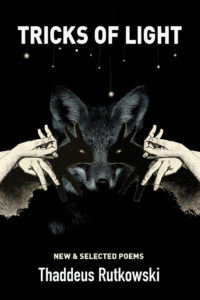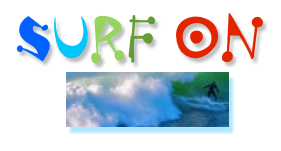BY C.M. MAYO — January 24, 2022
UPDATE: This blog was then entitled Madam Mayo (2006-2022).
This blog posts on Mondays. Fourth Mondays of the month I devote to a Q & A with a fellow writer.
“I’d rather read in person than on Zoom. In person, the audience can (usually) see the whole body, not just the face, of the reader, and I like to think that larger picture is part of my delivery. “— Thaddeus Rutkowski

It was in an AWP Conference Book Fair some years ago that Thaddeus Rutkowski first popped up on my writerly radar. Then, at the 2019 AWP, I attended the Gival Press authors reading. Wow! Rutkowski reads his poetry like no one else. No surprise to later learn (check out his bio on his website) that he is a one-time winner of the Nuyorican Poets Café Friday slam, the Poetry Versus Comedy slam at the Bowery Poetry Club, and the Syracuse poetry slam. He lives in Manhattan but travels afar to read. If you ever have a chance to attend one of Rutkowski’s readings, or can catch one on Zoom, throw your schedule to the buffalos!
Rutkowski’s latest publication is a collection of poetry, Tricks of Light (Great Weather for Media, 2020), and apropos of that:

C.M. MAYO: What inspired you to write Tricks of Light? Can you talk about its genesis?
THADDEUS RUTKOWSKI: In 2018, I started writing poems for a new book. I’d published my first book of poems, Border Crossings, in 2017.
Jane Ormerod of the small press Great Weather for Media heard me read from Border Crossings and asked if I had another book like it. I didn’t, but I thought I could write one. I told Jane I would work on it, and I kept in touch with her about the project.
I began with pieces about the sights and sounds from my daily routine in Manhattan’s Lower East Side. But I needed some pieces to fill the beginning of the book, which goes back to my childhood. After about a year, I completed a new manuscript and sent it to Jane. She was very patient in waiting for it.
C.M. MAYO: If a reader were to read one poem in this collection, which one would you suggest, and why?
THADDEUS RUTKOWSKI: I’d pick the one the editors of Great Weather—Jane, Thomas Fucaloro, David Lawton, and Mary Schlecta—chose to promote the book, “Farmers and Dove.” I wrote this poem while sitting on the front steps of my mother’s house in central Pennsylvania. Across the road, a couple of farmers were harvesting corn. At the same time, a mourning dove was calling. The scene reminded me of my childhood in this same village; it also reminded me of my brother, who had recently passed. But the reference to my brother isn’t spelled out; I refer only to “what’s lost.”
The publisher made a handout of this poem to give away with any book purchase—mainly at book or poetry festivals.
C.M. MAYO: Which of these poems is your personal favorite? Why?
THADDEUS RUTKOWSKI: What comes to mind are the poems that are family snapshots. A number of the poems are snapshots of my current family: my wife and daughter. So all of those would be favorites.
While I was working on this book, our daughter was living with us. She is now in college in Ohio.
C.M. MAYO: As you were writing, did you have in mind an ideal reader?
THADDEUS RUTKOWSKI: This doesn’t answer your question, but as I was/am writing, I have in mind an obligation to the reader. That is to be clear as I can be, so that the meaning that is taken is what I intended. This is not to say that everything is spelled out, but that the tone is clear, whether it is ironic, humorous, observational, etc. Ideally, I will be able to connect with the reader cleanly and directly.
C.M. MAYO: Which poets have been the most important influences for you? And for Tricks of Light in particular?
THADDEUS RUTKOWSKI: When I was younger, I read books of poetry by Richard Brautigan and Raymond Carver. I never heard Brautigan read live, but I understand he was a great reader. I heard Carver read prose, not poetry—I believe he is better known for prose.
Also when I was younger, I would photocopy W.S. Merwin’s poems from the New Yorker—the trade magazine where I worked had a subscription. I probably still have those photocopies. I also saw Merwin read aloud once, at the New School in Manhattan.
I have enjoyed hearing a number of poets read live: Paul Beatty, Russell Edson, Reg E. Gaines, Tess Gallagher, Thom Gunn, Joy Harjo, Charles Simic, James Tate. But perhaps the most compelling was Patti Smith—I’m talking about her spoken-word performances, not her singing, though I’ve also heard her with her band. When she spoke, you paid attention, and there was the feeling that, true or not, she had some wisdom to pass along.
C.M. MAYO: Which poets and writers are you reading now?
THADDEUS RUTKOWSKI: For myself, I’m reading only Americanah, by Chimamanda Ngozi Adichie. She opens up the world from the point of view of an African Black woman who travels the United States. The view is as complete as it needs to be; it is expansive. It is sort of the opposite of my own Minimal approach.
C.M. MAYO: How has the Digital Revolution affected your writing? Specifically, has it become more challenging to call down the Muse with the siren calls of email, texting, blogs, online newspapers and magazines, social media, and such? If so, do you have some tips and tricks you might be able to share?
THADDEUS RUTKOWSKI: I understand the internet is distracting—for me as much as for anyone. But I also see the upside. Research has become easier; I can look up facts, people, concepts more quickly than before. Also, it allows people to connect with one another—an effect that is both good and bad. Good in the sense that one has more connections. Bad in that much information is misunderstood and misused.
Good or bad, the digital universe is part of life. I can’t imagine (anymore) the times without it.
C.M. MAYO: Have you done readings on Zoom? (How has it been to read poetry on Zoom? Do you see the future all Zoom-y?)
THADDEUS RUTKOWSKI: I’ve done a number of readings on Zoom. The launch of Tricks of Light was on Zoom in 2021, and it went well. It allowed people from all over to “be there.” We haven’t had an in-person launch for this book, and at this point I doubt we will.
That said, I’d rather read in person than on Zoom. In person, the audience can (usually) see the whole body, not just the face, of the reader, and I like to think that larger picture is part of my delivery. I saw on the TV news yesterday that the stock value of Zoom is going down. This could be a sign.
C.M. MAYO: For those looking to publish a book of poetry, what would be your most hard-earned piece of advice?
THADDEUS RUTKOWSKI: My advice, other than to take as much care as possible with the writing itself, is to be aware of and connected to the poetry world. Go to readings, take workshops, read in open mics, keep in touch with like-minded people. Your writing might be strong enough to find its place without these other factors, but if you’re like me, you’ll need all the help and support you can get.
C.M. MAYO: What’s next for you as a writer / poet?
THADDEUS RUTKOWSKI: I think my next book will be a collection of flash fictions, but hopefully it will be something more than a collection. I’ve been gathering short prose pieces and arranging them in what I hope will be a linked sequence. It’s what I’ve done with my earlier books Roughhouse, Tetched, Haywire, and Guess and Check. My book Violent Outbursts was different; it was a collection of unlinked short prose pieces, most of them begun as exercises with my workshop students.
My next project probably won’t be a book of poetry, because I’m mainly a fiction writer. Still, I write poems, and I save them, so maybe they will be collected in another book.
By Thaddeus Rtkowski
From Tricks of Light
FARMERS AND DOVE
When sunlight hits the higher points
and the lower places remain in shadow,
two farmers harvest corn together.
One drives a pickup truck,
while the other follows alongside,
stripping ears off stalks
and tossing them into the truck bed.
On a telephone wire above the farmers,
a mourning dove coos for what’s lost,
for some unspecified thing that’s missing
The calls aren’t sad for the dove,
only for those who are listening.
For those of us who know what’s missing,
the sounds of the bird remind us of what’s lost.
EMPTY NEST
I have a feeling that something is missing,
because our child is no longer living with us.
I was focused on her, and on her only,
and now I’m not focused on her
unless she contacts me,
and she doesn’t contact me often.
I could contact her,
but I would need a good reason.
She and I aren’t in the habit of waving
at each other over distance, in cyberspace
just for the sake of waving.
I can see this emptiness as freedom,
a space in which to do what I like.
I don’t need to fill the space
with someone else to take care of,
someone like a pet: a dog or a cat.
I don’t need a pet to feed
and/or walk on a regular basis.
I don’t need to worry about a pet’s survival
when I go away from home for a while.
A pet wouldn’t make me happier,
though I would make a pet happier.
Visit Thaddeus Rutkowski at www.thaddeusrutkowski.com
I welcome your courteous comments which, should you feel so moved, you can email to me here.

Q & A with Joanna Hershon on Her New Novel St. Ivo
Q & A with Biographer David O. Stewart on the Stunning Fact of George Washington
Notes on Tom Lea and His Epic Masterpiece
of a Western, The Wonderful Country

